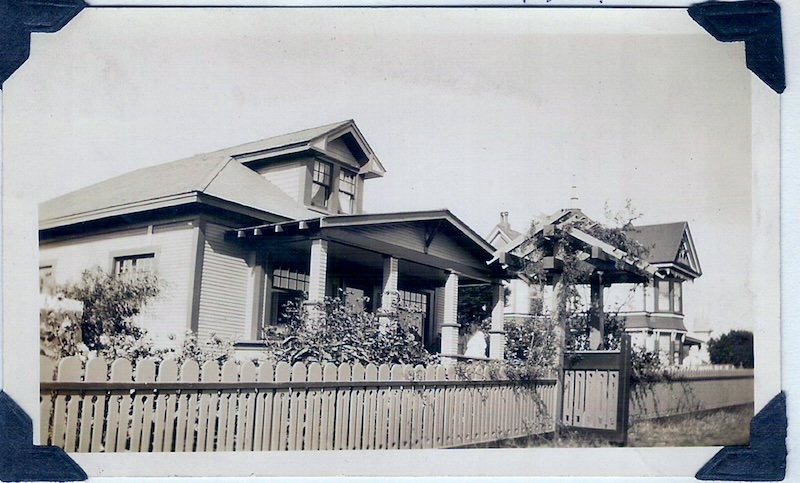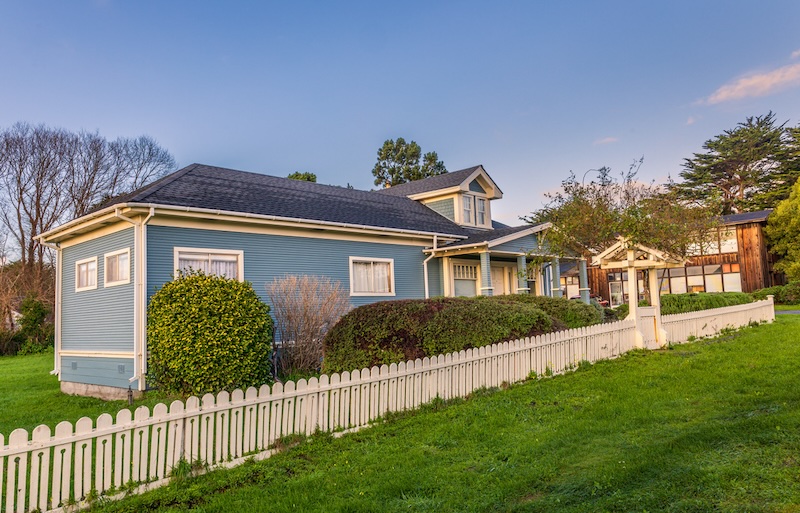These two photographs, taken almost a century apart, look northeast from just west of the intersection of Little Lake and Williams Streets in Mendocino. The front and west sides of the Gordon-Mendosa House, located at 45300 Little Lake Street, can be seen on the left sides of both photos. (More about the buildings on the right sides of the photos below.) This lot was vacant in August of 1911 when Cathrin Denslow Morgan sold it to Henry and Henrietta “Etta” Gordon.
Henry was a Canadian woodsman who came to the Mendocino Coast in 1880 and worked as a chopper, and later a chopping foreman, for several coast lumber companies. Etta was originally from Maine and arrived on the coast about 1885. The Gordons married in 1908. This was Etta’s second marriage. She was the widow of Mendocino Lumber Company woods boss Edward Hatch, who died in 1905.
Foster E. Sherwood completed the five-room bungalow for Mr. and Mrs. Gordon in October, 1911. The house was built in the early Craftsman style with dormers and a front porch with wide columns. The Mendocino Beacon described the home as “a modern cottage of very attractive appearance and most convenient interior arrangement.”

Gordon-Mendosa House, 1929. (Courtesy of the Kelley House Museum)
The Gordons led a happy life here, surrounded by Etta’s flowers. She was a gracious hostess and delighted in having her friends over for a meal. Former Mendocino residents visited her when they came to town, and she insisted her old-time friends make her home their headquarters during their stay.

Gordon-Mendosa House, 2024. (Photographer: Robert Dominy)
Improvements to the Gordon house were made over the years. In 1913, Perley Maxwell, a local contractor, added the pretty decorative fence with artistic gateway. In 1928, Maxwell made more extensive improvements, including the addition of an entirely new front on the residence.
Etta passed away in 1939, and Henry followed in 1945. After Henry’s death, the property was rented to Mr. and Mrs. Mervin Swanson of Fort Bragg. In 1947, T. F. Arvola, who came to Mendocino to lead the Mendocino Woodlands project, rented the bungalow for his family. Arvola received a promotion in 1949, and the family left for Sacramento that year. George Grau of Sacramento replaced Arvola at the Mendocino Woodlands, and he moved into the house with his wife and son.
In 1952, a new chapter for the house began on Easter Sunday when Henry Gordon’s great-nephew, Alvin Mendosa, exchanged wedding vows at the Mendocino Presbyterian Church with his high school sweetheart, Jeanette Fraser. Following their honeymoon, the couple made their home here. Alvin added the west wing seen in the color photograph to accommodate their growing family. Jeanette passed away in 1990, and Alvin in 2022. Today, the Gordon-Mendosa House remains in the Mendosa family.
Cathrin Denslow Morgan’s mansion can be seen to the right of the Gordon-Mendosa House in the 1929 photo. This was the last of four Mendocino houses designed by Cathrin’s father, Charles Denslow, bookkeeper for the Mendocino Lumber Company. Master carpenter J. D. Johnson began construction in March, 1889, and the three-story structure took more than a year to complete. The interior fittings were as elaborate as the exterior design. Clear, first-growth redwood was used throughout, and coved metal ceilings stamped in leaf design were ordered from New York’s Metal Ceiling Company for the parlor and dining room.
Cathrin lived here until her death in 1925. The following year, Cathrin’s son sold the home to physician Russell Preston. Preston made a number of improvements to the large house, and many of Mendocino’s teachers and nurses rented rooms there.
The mansion was featured as the brothel in the 1954 movie, “East of Eden,” starring James Dean. At the time of filming, Preston lay dying upstairs, but he insisted that filming continue. Peter Paoli bought the house after Preston’s death, but a chimney fire destroyed it 1956. The property was purchased by Bill Zacha in 1959, and the site is now the home of the Mendocino Art Center, which can be seen on the right side of the 2024 photo.
The Kelley House Museum is open from 11AM to 3PM Friday through Sunday. If you have a question for the curator, reach out to curator@kelleyhousemuseum.org to make an appointment. Walking tours of the historic district depart from the Kelley House regularly